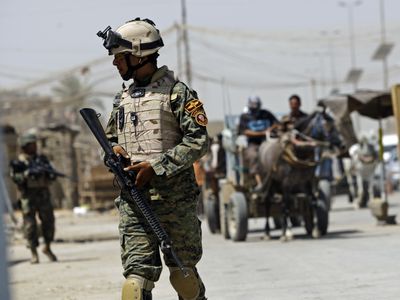Market blast kills scores
Attack comes as U.S. forces prepare to leave area

BAGHDAD – A powerful bomb killed more than 75 people Wednesday night at a market in Sadr City, Baghdad’s main Shiite neighborhood, casting doubt on the readiness of Iraq’s security forces to keep a latent insurgency in check as U.S. troops pull out of the capital and other cities.
The blast, the second in Iraq in less than a week to kill more than 70 people, happened six days before the June 30 deadline for U.S. troops to retreat from urban outposts, the first of three withdrawal deadlines mandated under a security agreement.
The blast at the Mredi bird market occurred shortly after sundown, when the area was crowded with residents out shopping after the summer day’s scorching heat had subsided.
The explosives were concealed under vegetables in the carriage of a three-wheeled motorcycle parked at the edge of the market, which is off limits to vehicles, officials and witnesses said.
As the smoke began to clear, residents returned to the site to look for wounded people, who were loaded onto vehicles and wooden carts. About 20 minutes later, Iraqi soldiers arrived and began shooting in the air to disperse the crowd, witnesses said. Residents hurled insults, stones and shoes at the troops.
“People were very mad because they were very late,” Abu Ahmed said of the soldiers. “They only sit on their chairs and watch people and play with cellphones.”
The attack, the deadliest in Sadr City in more than a year, came just days after the U.S. military closed its small outposts in the area at the Iraqi government’s insistence.
“This is one of the biggest mistakes the U.S. has made,” said Kadhum Irboee al-Quraishi, a local leader in Sadr City who has worked closely with the Americans. “Assassinations will start again, and the terrorists are going to show that Iraqi forces are not capable of receiving responsibility.”
Sadr City is the stronghold of anti-American Shiite cleric Muqtada al-Sadr. Militias loyal to al-Sadr controlled the area until the Iraqi army was deployed there in the spring of 2008 as part of a delicate negotiation between Sadrist leaders and Prime Minister Nouri al-Maliki.
Al-Maliki and U.S. commanders have said they expected the June 30 deadline to trigger an uptick in violence. Extremists, they say, are motivated by a desire to undermine the Iraqi government.